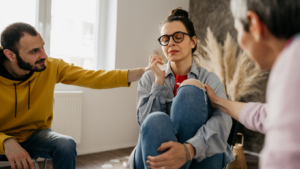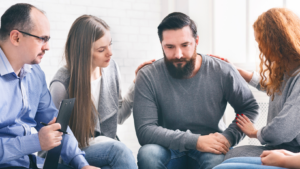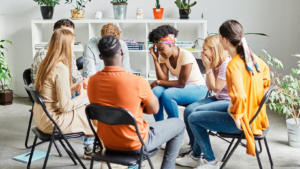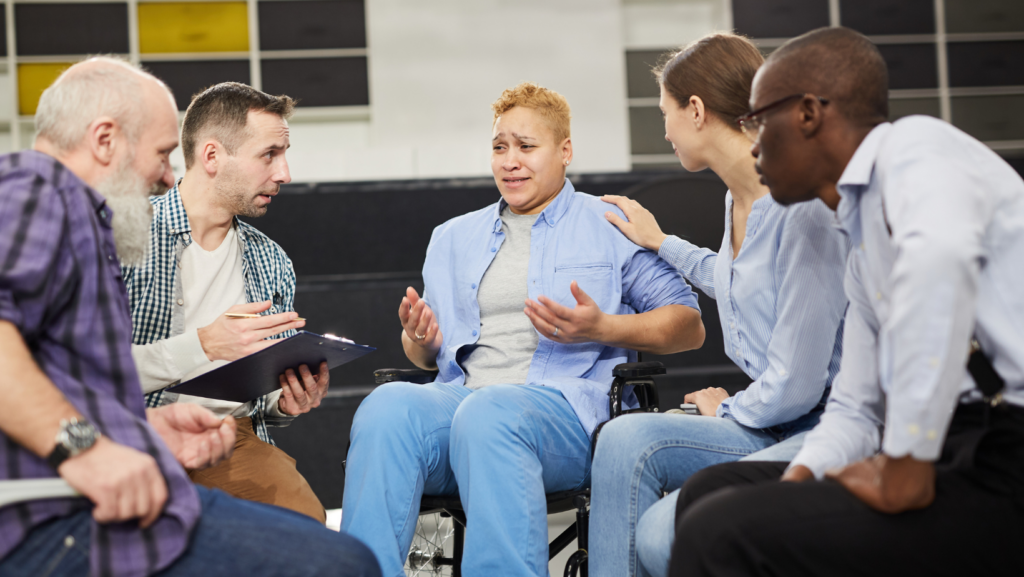When life hands out its toughest times, it’s often a shared struggle that brings solace. This is especially true for those battling the invisible enemy of depression. Support groups, a lifeline for many, offer a space where understanding, empathy, and mutual experiences converge.
From online forums to face-to-face meetings, these groups provide a unique platform to share, learn, and heal. They’re not just about coping, but also about empowering each other to reclaim life from the clutches of depression.
So, let’s delve deeper into the world of support groups depression, exploring their significance, benefits, and the different types available. It’s a journey of discovering how collective strength can light the path towards mental wellness.
Support Groups Depression

Harnessing the power of collective strength through support groups depression presents a credible pathway towards managing depression. By delving into the concept of support groups and illustrating how they help combat depression, the article illuminates the importance of shared experiences in dealing with depressive disorders.
Different Types of Depression Support Groups
Essential to the management of depression are diverse support groups. These groups can be broadly classified into two main categories: in-person support groups and online support groups. Both types have unique characteristics and advantages that cater to the varied needs and preferences of individuals dealing with depression.
In-person Support Groups

In-person support groups introduce a physical setting where members gather regularly to share experiences and coping strategies. Deep interpersonal relationships are fostered through face-to-face interactions, creating a sense of community and mutual empathy. Examples include Depression Anonymous, group therapy sessions, and programs offered by local community centers and healthcare facilities.
Member stories of overcoming depressive challenges in such venue often resonate more deeply, becoming pillars of hope and inspiration. Interaction in real-time allows for immediate feedback, shared experiences, and strong support bonds. Yet, attending in-person has its challenges—geographical limitations, issues with scheduling, or discomfort in physical group settings might deter certain individuals.
Online Support Groups
On the other hand, online support groups, such as the Reddit /r/depression community or Elefriends platform, address many such concerns by providing a safe virtual space for members to connect, share, and inspire. The Internet’s vast reach bridges geographical barriers, making support more accessible to individuals worldwide. Round-the-clock availability affords members the convenience to engage in dialogues, share experiences, and seek advice at any time, from any location.
In an atmosphere of anonymity, members find it often comfortable to express their thoughts and emotions more openly. Using technology, such platforms broaden the access to useful resources like webinars, podcasts, professional consultations, and mental health awareness campaigns. However, the inability of establishing in-person relationships is sometimes seen as a drawback to online groups, particularly for individuals who crave physical communion.
Tips for Maximizing Benefits from Support Groups

Identifying the optimal strategies for harnessing the full potential of support groups depression ensures individuals coping with depression derive maximum benefit. These strategies range from maintaining a consistent group presence to staying engaged in discussions, and integrating key learnings into everyday life.
One primary tip focuses on regular attendance. Consistent interaction, whether in online or in-person support groups such as the Depression and Bipolar Support Alliance (DBSA) or the Mood Network, enhances trust and fosters strong empathetic connections. Therefore, it’s crucial to make a commitment to regularly attend meetings.
Actively participating in discussions proves essential. Alone, simply attending a group won’t yield maximum benefits. Member engrossment in conversations, sharing personal experiences, and asking relevant questions enrichens their understanding and builds emotional resilience.
Formally integrating learnings into daily routines, gathered from collective group knowledge, presents another effective strategy. For example, practicing mindfulness exercises recommended by Mood Network or adopting lifestyle advice from Elefriends helps in better management of depressive symptoms.
Turning shared experiences into personal strategies bolsters progress. Learning from others’ experiences, such as coping strategies they’ve utilized, or even mistakes they’ve made, and implementing these learnings into personal plans equips individuals with practical techniques for battling depression.
Conclusion
In the journey toward healing from depression, support groups stand out as a powerful and accessible resource. They offer more than shared experiences—they provide connection, empathy, and the reassuring knowledge that no one is alone in their struggles. From fostering open dialogue to reducing the stigma around mental health, these groups serve as a vital complement to traditional therapies and treatments. Their power lies in the collective strength of individuals coming together, learning from each other, and building a foundation of mutual understanding and encouragement. Whether someone is newly diagnosed or managing long-term symptoms, participating in a support group can be a transformative step toward recovery. As mental health awareness continues to grow, so too does the importance of safe, supportive spaces. Embracing the power of community through support groups can help pave the way toward emotional wellness, resilience, and a more hopeful outlook on life.

